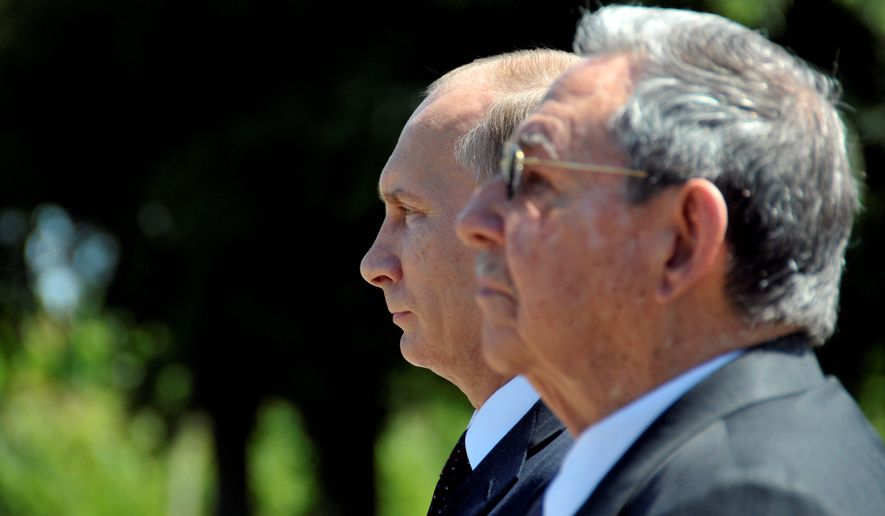President Obama’s surprise economic and diplomatic opening to Cuba Wednesday comes at a time when Vladimir Putin’s Russia has been trying to revive Moscow’s once-close ties to the Castro regime, a longtime ally of the Soviet Union during the Cold War.
Mr. Putin has received support from the Castro regime in Russia’s skirmishes with Ukraine this year, and Russian officials have held talks on rebuilding the security relationship. But with Russia’s economy cratering this week, Cuba appears to be looking elsewhere for more stable economic support, experts say.
“If you look around the world, [Cuba is] in urgent need of economic resources, hard currency. Russia’s under sanctions, of course, Iran’s under sanctions, the Chinese are pretty hard-headed businesspeople,” said Paul Webster Hare, a former British ambassador to Havana. “So if they want to quickly turn on the tap of new hard currency, America is top of the list.”
Mr. Putin visited Cuba as part of a tour of Latin America over the summer and is forgiving 90 percent of Cuba’s Soviet Union-era debt, a total of more than $35 billion. Though the ties between the two countries were strained by the collapse of the Soviet Union, Cuba was one of the few supporters of Russia in its recent push into the Crimean Peninsula of Ukraine.
The trip resulted in a number of accords to expand energy exploration efforts and preliminary talks on Russia helping modernize the Port of Mariel and building a nearby airport and cargo terminal. Mr. Putin also denounced the U.S. trade embargo.
“We will provide support to our Cuban friends to overcome the illegal blockade of Cuba,” he said.
But Mr. Putin denied reports in the wake of the trip that Russia was planning to reopen an intelligence facility in Lourdes, Cuba, that was closed more than a decade ago.
But even talk of such a move calls to mind the strong ties between Cuba and the old Soviet Union during the Cold War, highlighted by the tense standoff with the Kennedy administration in the 1962 Cuban Missile Crisis.
Mr. Putin can’t be thrilled with the announcement of warming U.S.-Cuban ties, said Robert Jervis, a professor of international politics at Columbia University.
“I wonder, did Castro tell Putin ahead of time?” Mr. Jervis said. “If he didn’t, and I were Russia I’d be more than a little annoyed.”
The move from Mr. Obama could have the perhaps unintended consequences of souring whatever goodwill Cuba had re-established with Russia, he said, although Mr. Putin could pitch Russia as Cuba’s only “reliable” friend, since measures like loosening travel regulations could simply be reversed by a new U.S. president after the 2016 election.
“He won’t renege on anything, but he won’t put any more in the pot to woo Castro,” Mr. Jervis said.
The two countries signed about a dozen accords over the summer in areas like energy, with Russian companies supposed to participate in petroleum projects and offshore oil deposits. But early exploration missions off of the island’s coasts have failed to uncover the major new deposits of oil and natural gas that the Castro regime had been banking on.
Venezuela, which faces economic problems of its own as oil prices plummet, has been the major supplier of energy and the single biggest trade market for Havana in recent years. Only 2 percent of Cuba’s exports in 2012 went to Russia, compared to 45 percent to Venezuela.
The collapse in the ruble may force Mr. Putin to turn to more pressing concerns at home, even as the Obama administration tries to expand the U.S. economic and diplomatic presence in Cuba.
Sen. Ted Cruz, the Texas Republican whose father was born in Cuba, drew the connection between Cuba and Russia on Wednesday, saying the Castro brothers received both international legitimacy and “a badly needed economic lifeline” from President Obama.
“But they remain in control of a totalitarian police state modeled on their old state sponsor, the Soviet Union,” he said. “They retain their close, long-standing ties with hostile nations, notably Russia, Iran, North Korea and Venezuela.”
• This article was based in part on wire service reports.
• David Sherfinski can be reached at dsherfinski@washingtontimes.com.




Please read our comment policy before commenting.